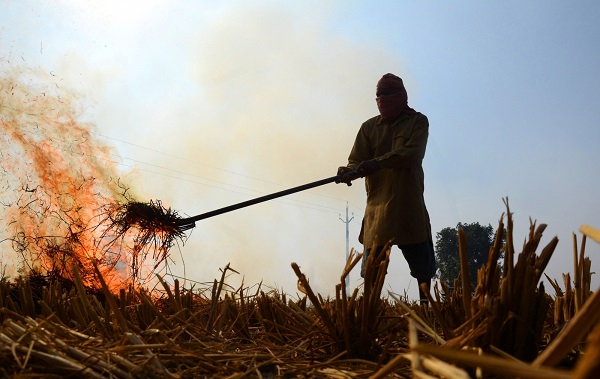Lucknow, (Asian independent) The Uttar Pradesh government has asked all District Magistrates and police chiefs to impose fines on those found burning stubble in fields.
As per the directives issued by the state’s Chief Secretary Durga Shankar Mishra, anyone caught burning agriculture residue or waste in their fields, the fine is Rs 2,500 if the field is less than 2 acres, Rs 5,000 of the field is 2 to 5 acres and Rs 15,000 if the size of the field is above 5 acres.
Mishra has asked concerned officials to ensure that no agricultural waste is burnt in fields.
He said a campaign should be organised to sensitise farmers against the ill effects of crop burning but if anyone is caught burning waste, then action should be initiated against them.
A government spokesman said: “The Chief Secretary has said that 14 instruments and machines have been identified for dealing with agricultural waste. It has been directed that farm banks, where common use instruments and machinery can be kept, should be set up and equipment given to individual farmers as per need. Individual farmers will get 50 per cent subsidy while Farmer Producer Organizations (FPOs), cooperatives and panchayats will get 80 per cent subsidy for establishment of machinery banks.”
The purchase of instruments and machinery should be completed by October 15.
As per the directives, agricultural waste from fields of those farmers who burnt this waste last year, should be collected and stored in cow shelters.
Of the farm residue so collected, 25 per cent should be used for mixing in the odder for cattle.
At least 20,000 tonnes of agricultural waste should be sent to cow shelters during this financial year and a scheme started by the government earlier, ‘Parali do Khad lo’ should be promoted extensively.
The official said that a penalty on farmers should be the last resort and an extensive sensitisation programme should be carried out first where farmers are told about the ill effects of burning agricultural waste and its impact on air, soil and water pollution.
Interactive sessions should be organised between farmers and agriculture experts.
In addition to this, nodal officers should be appointed for every revenue village and it will be the responsibility of revenue officials (lekhpals) to ensure that no farm fires take place.








